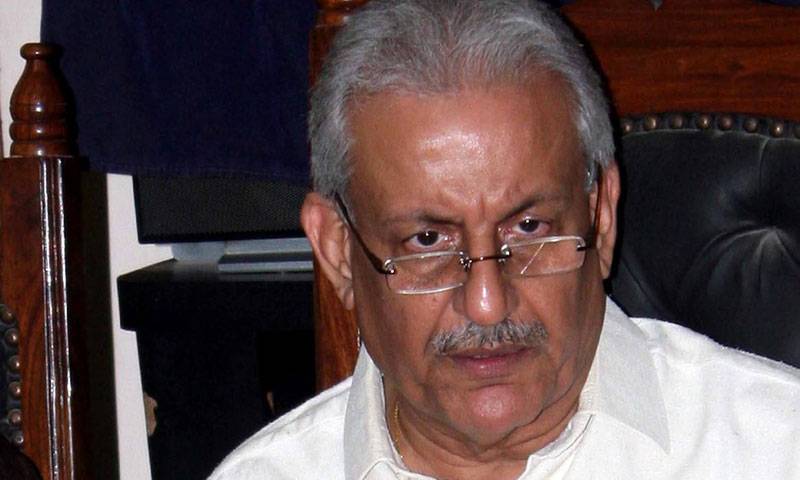Addressing the university students and faculty on the topic of issues in contemporary Pakistan recently at Islamabad, Chairman Senate of Pakistan, Mian Raza Rabbani observed that unfortunately, application of law is different for people belonging to different stratums of society. The powerful can buy justice for them and poor people keep wandering in search of just treatment. He further stated that, “If law was respected in the country and constitutional supremacy was accepted, then there was no reason that institutions could not be strengthened, a stable system could not come into place and law of land was not supreme.” The chairman senate said that the implementation of the 18th amendment is a far cry and non-implementation would weaken the institutions. He was of the view that the real renaissance of society is working in retrogression and it is becoming an intolerant society against the teachings of the founder of the nation Quaid-e-Azam Mohammad Ali Jinnah.
A few days ago, Islamabad Police booked about 180 farmers after firing tear gas shells and using water cannons to disperse farmers who were demanding their due rights and relief in the federal budget hours before its presentation at D-Chowk Islamabad. They were of the view that the policies for growers are formulated by those who do not even know about the basics of agriculture. The farmers demanded of the government to abolish taxes on agriculture and fix the prices of commodities. All the segments of the society condemned the crackdown on peasants and farmers in Islamabad and termed it denial of freedom of movement, assembly, association and speech which has been guaranteed by Constitution of Pakistan.
During the process of the purification of the 1973 Constitution in the year 2010, the 18th Constitutional Amendment was passed unanimously. The landmark amendment introduced changes to about 36 percent of the Constitution of Pakistan, as 102 out of 280 articles were amended, added, inserted, substituted or deleted. The 18th Constitutional Amendment has redefined the structural contours of the state through a paradigm shift from a heavily centralised to a predominately decentralised federation. It is a matter of great concern that significant federal institutions and implementation mechanisms for devolution at all levels of government are still undeveloped or non-existent.
It is a matter of concern that even after a lapse of seven years since the historic 18th Constitutional Amendment in 2010, its effective implementation is still in limbo. The real fruits of decentralisation, devolution of powers and empowerment of people at the grassroot level could not be availed by Pakistani citizens. In spite of unanimous decisions of the multi-party Constitutional Implementation Commission headed by Senator Mian Raza Rabbani, some of the critical issues still remain unresolved. These include; joint ownership of natural resources; establishment of Commission on Standards in Higher Education and Research and policy regulation and supervisory control of Council of Common Interests (CCI) over the subjects enlisted in the Federal Legislative List Part II, such as railways, standards in higher education, federal regulatory bodies, census, electricity, legal, medical and professions. The annual allocations for these subjects, which are under the domain of the CCI, are being made without review and approval of the CCI. The CCI is as an important constitutional organ and a central political institution that regulates competence and settles disputes between federal government and provinces. But, unfortunately, the commitment to establish a permanent secretariat of the CCI has not yet been fulfilled. About 48 identified federal laws have still not been amended in line with the Constitution of Pakistan.
The Constitution of Pakistan clearly stipulates that adequate provisions shall be made for ensuring supremacy of constitution, rule of law and equality of citizenship. Therein shall be guaranteed fundamental rights, including equality of status, of opportunity and before law, social, economic and political justice, and freedom of thought, expression, belief, faith, worship and association, subject to law and public morality. It further states that adequate provisions shall be made to safeguard the legitimate interests of minorities and backward and depressed classes. In addition, articles 20, 21, 22, 25, 26, 27, 28 and 36 of the Constitution of Pakistan guarantee equal citizenship and protection of rights of minorities.
Article 8 of the Constitution of Pakistan, which is the starting article of the fundamental rights chapter, clearly states that the State shall not make any law which takes away or abridges the rights and any law made in contravention of fundamental rights of the citizens, be void. In addition, 24 articles of the Constitution of Pakistan guarantee fundamental rights of the citizens which are still missing in our curriculum at all tiers of education.
It is quite unfortunate that these fundamental constitutional rights are taken away through imposing colonial law Section 144 which is being frequently used by the democratic governments which claim to be custodians of civil liberties. Academic freedom, autonomy of the universities, accountability and raising questions over performance of certain personalities and institutions are being discouraged and who raise such questions, are made lessons for others.
Without supremacy of constitution, rule of law and equality of citizenship, it will be far cry for us to make progress as a nation in various spheres of life.






